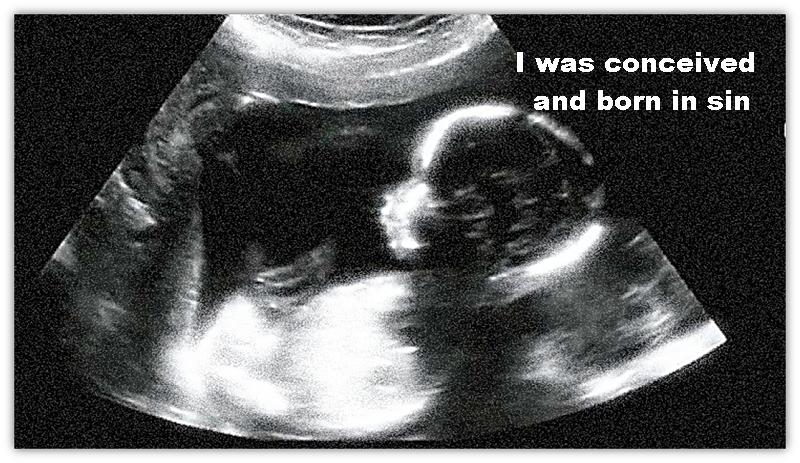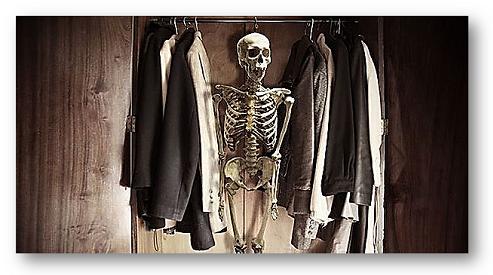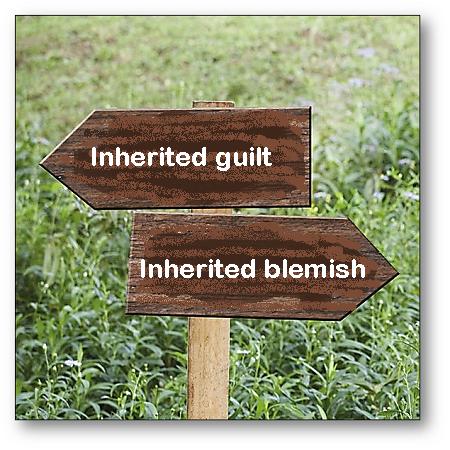Original Sin: A Difficult Doctrine
Original Sin: A Difficult Doctrine

Can you confess original sin? The question here is not whether the doctrine of original sin can be described in a confession, or whether you can subscribe to the doctrine of original sin (or inherited sin) as worded in the confessions. The question is: can you say to God: “Lord, I am a sinful being, I was conceived and born in sin, I have the sin of Adam, of my forefathers in me, it is my fault, forgive me!”?
That is more difficult than confessing your sins. It goes deeper. You know that you have made mistakes. You also know that you do wrong things repeatedly – in your thoughts at the very least. Therefore you sincerely ask forgiveness for that. However, having a sinful nature that you inherited from your forefathers, beginning with Adam and Eve – do you recognize that as your sin, your fault? Something, to ask forgiveness for? Should you? Surely you can’t do anything about it?
Questions⤒🔗
The doctrine of original sin has always been a central target for criticism of Christian teaching. That and the doctrine of predestination, to which it is connected. For the more we confess to being radically contaminated, the more we will admit that we can only be saved by God, without any input from ourselves, and only thanks to His grace in choosing us.
The critics say: the doctrine of original sin teaches that we are sinful when we can do nothing about it. At birth we are given this burden to carry that we have not chosen. And we drag that along with us our whole life. That is unfair!
Why? Why does God allow that? Why did He allow Adam and Eve to sin so badly that the whole of humanity was soiled by it? Why did he bind such terrible consequences onto that one sin? On top of that, the critics continue, we are even blamed for that original sin. We are told that we must change and at the same time we are told that we cannot change ourselves. We are sinful people and we will remain so, in this life at least. That message is paradoxical. “Helpless, yet guilty” was the title of a book on this subject that claimed attention some time ago. One can only become very despondent after such a message – depressed even. The conviction of the Reformed life breathes a gloomy atmosphere. The fact that so many people in (conservative) Reformed churches suffer from depression is due to the doctrine of original sin. The criticism does not only come from outside the church. There are also questions arising from within. These questions about original sin keep coming up in catechism classes, among involved and reflective pupils – and even among children before catechism age. Even theologians who confess this doctrine admit that it is a difficult subject.
Corruption←⤒🔗
Yet there is not only criticism, there is also agreement. There are many who do not concur with Christian doctrine as a whole, who do not believe in Christ, and yet recognize that man is corrupt by nature. This view emerged in the twentieth century especially. Two world wars had put an end to the optimistic view of man that had long been dominant in the West since the Enlightenment, and made it terribly clear that man was in a much worse moral state than was believed until then. And this carries on in current times: openly in dictatorships, corrupt regimes and terrorist groups; but also there is much that goes on behind the scenes that is not at all noble within democracies based on noble principles and correct rules: the drive to be important, the grab culture, power politics ... There are skeletons in the cupboard and there is dirt waiting to be dug up. History seems to be one giant lesson in man’s incorrigibility (even though this conclusion is not always drawn and is usually quickly forgotten).

Such reports and analyses often contain a hint of arrogance: the researcher and writer himself is above it all, he sees right through it, he himself is a better person. That is not always the case, however: novels, for example, can be very melancholy, the theme being that no one can escape this inner misery. Literature can even become cynical, or indifferent: that is just the way we all are – so what?
Popular science feeds this thought. The evolutionist view of man declares that man stems from the animal realm. He has climbed up from this low state. By nature, he is not a high standing ethical creature. He is ruled by his primitive urge for self-preservation, preservation of the species. What Christianity refers to as ‘original sin’ is natural: it is inherent in man.
The psycho-analytical view of man portrays the human as a barrel full of low down, mainly unconscious drives that he must learn to control: he can be more or less successful in that. Accepting ‘original sin’ as a low element in yourself is a matter of realism and adult self-acceptance.
Well←⤒🔗
What does the term ‘original sin’ (or ‘inherited sin’, which is the sense of the term in Dutch) mean? This word has often been criticized, as if it were not very well chosen. The term contains the following elements, which are not always clearly distinguished.
- The first sin, committed by Adam and Eve in paradise.
- The sinful nature, which was the consequence of that first sin. The sin was not an incidental deed: it resulted in man’s nature becoming contaminated or blemished, both spiritually and ethically.
- The fact that this contaminated nature is passed on from Adam and Eve to all their descendants, to all people.
- The result thereof: that all men are conceived and born in sin; that they carry a sinful nature with them from their origin.
- The fact that this sinful nature always brings forth sinful deeds, just as a well brings forth water.
In theology the Latin term ‘pecatum originale’ is also used, which is more like the English term ‘original sin’. This term points more to the first sin itself than to the consequences. Yet the doctrine of original sin is mostly about the consequences. It is important to think about the doctrine of original sin. If we have no clarity on this, how will we respond to the criticism? How will we even be able to answer our children’s questions, the questions that become more and more critical as they grow up? And how will we then confess our original sin before God?
Guilty and Blemished←⤒🔗
Traditionally, two aspects are distinguished in ‘original sin’, namely, ‘inherited guilt’ and ‘inherited blemish’. The latter usually forms the centre of attention. This ‘blemish’ or ‘corruption’ or ‘contamination’, refers to our sinful nature, which is passed on from parents to children. The word ‘inherited guilt’ means: sin makes us guilty in God’s eyes; and that guilt is also passed on from the first people to all their descendants.

The distinction between ‘inherited guilt’ and ‘inherited blemish’ played a part in the discussion that took place around the 17th century French theologian La Place (Placeus). His doctrine was condemned by a synod and subsequently in a Swiss creed. He rejected the idea that the guilt of the parents could be transmitted to the children; that seemed unjust to him. He was of the opinion that only the sinful nature of the parents was passed on to the children. Thus the children are also sinful and therefore they are guilty. Placeus argues that in this way he remains faithful to the doctrine of original sin. The valid teaching is that God makes us accountable for the first sin, that of Adam. Placeus explains this as follows: the accountability takes place through the ‘being conceived and born in sin’; not directly. In theological jargon: he rejected the “immediate accountability” and taught the “mediate accountability”: Adam’s guilt is reckoned to the descendants only mediated by the inherited blemished nature, not in the way of an imputation of Adam’s actual sin.
Two Theories←⤒🔗
Concerning the manner in which sin is transmitted from Adam to his offspring, two theories always circulated: the first takes its starting point in the well-known expression from the doctrine of original sin “in Adam all have sinned”. This description is derived from a certain translation of Romans 5:12. According to this opinion, we should interpret that text as literally as possible. We were involved in Adam’s sin. We were “in his loins.” That is an expression derived from Hebrews 7:10. There the Scripture states that when Abraham gave the tenths (or tithes) to Melchizedek, Levi was, so to speak, in his loins, in his body; so it can be concluded that the Levite priesthood, in Abraham, paid dues to its superior: Melchizedek. According to this theory, we were in Adam’s loins when he committed sin. We participated in his sin and therefore participate in the guilt. This theory is called “realism”. In order to understand that term we had better forget the current meaning of the word for a moment. In this connection it means: we participated in the original sin, in all reality. The advocates of this theory are aware of the problems it holds, and these have been repeatedly brought forward. For it appears to imply that we were already there in paradise: a sort of preexistence. The expression: ‘so to speak’ is therefore unavoidable in this context. Yet they maintain that it must be understood in a very concrete manner. In their opinion, this is necessary in order to maintain that we are truly guilty of Adam’s sin. They admit that the connection is a difficult one to understand, but say that we must simply accept it.
Another objection brought forward against realism is this: does it mean that we are guilty not only of Adam’s sin but of that of his offspring also, of all the sins of his descendants, all the sins of our ancestors?
The other theory takes its starting point from the fact that Adam was appointed our head in the covenant that God made with people. Adam carried the responsibility for us all, all mankind. So when he committed sin, all of mankind was involved. We share in Adam’s responsibility in God’s covenant. This view too is based on Romans 5. The term for it is “federalism”, meaning the covenant view.
Nature and Law←⤒🔗
These days it is customary not to defend either of these theories expressly. It is recognized that both are somewhat unsatisfactory. Certain weaknesses of the one theory must be compensated by the other, approaching the matter from another angle, without drawing one clear and complete image. It is also recognized that “hard” scriptural evidence cannot be brought forward for either of these views.
The doctrine of original sin does however stand steadfast in the Reformed creed and theology. Any form of Pelagianism – the doctrine that man came into the world as an unblemished blank page and only starts sinning under the influence of others – is rejected. Nevertheless, the manner in which the sin is transmitted from one generation to the next remains an embarrassing issue for theologians. What is the connection between our first forefathers and ourselves? We were not there when Adam and Eve ate the forbidden fruit! How can God hold us accountable for that sin? Is it fair of God to allow us to be conceived and born in sin? The Canons of Dort state that “the corruption spread, by God’s just judgment, from Adam to all his descendants”.1 In the Swiss creed mentioned above this has become “God’s hidden and just judgment”.

On first impression, both aspects discussed here appear to function alongside each other: realism places the emphasis on inherited blemish; federalism on the inherited guilt. Both distinctions do not coalesce: inherited guilt and inherited blemish are two aspects of original sin; realism and federalism concern the manner in which original sin is transmitted to, and continues to work in, the following generations. But we may let that rest. In both distinctions we recognize the two ways of thinking: for one, the point of emphasis lies on man’s sinful nature; for the other, in the relationship in which man stands to God, the legal relationship specifically. As far as the latter aspect is concerned, in order to avoid the term ‘judicial’, one often prefers the word ‘forensic’. Man stands before God’s throne, the judgment seat of the heavenly judge, and God declares him guilty.
Baby←⤒🔗
In the doctrine of original sin, distinction is made between original sin as the sinful nature of man, of which we all partake, and the sinful deeds that we do individually (see e.g. The Heidelberg Catechism, Lord’s Day 3). The sinful nature is something we all have in common, but in the commission of sin we differ. We are all guilty of a sinful nature, yet children do not pay for the actual sins of their parents, as Ezekiel 18 clearly teaches, but only for the sins they themselves commit.
It is difficult to envisage that a newborn baby is already sinful: it seems unreasonable and insensitive to accuse an infant in such a manner. The happy and proud parents’ feelings tend to urge them to rise to its defence. Often it is softened in the following way: the child is already sinful, but it does not yet commit sin. The first is acceptable, even though it is hard to understand, and the addition then has a soothing effect.
Genetic←⤒🔗
Is the term ‘inherited sin’ all that well chosen? It directs our attention not so much on the ‘law of inheritance’, which plays its part when someone has passed away, as on heredity, which plays a role when people conceive a child. Is original sin comparable to this?
Skin colour and the colour of one’s eyes are hereditary, as are certain diseases. Furthermore, someone can display his parents’ features remarkably well in his looks, his character, and behaviour, even from early childhood. Often we assume heredity, although it cannot be proven – it could just be a matter of influence and imitation. Sometimes we know that diseases are hereditary. The expertise on this subject is growing continually. That sort of knowledge can be disappointing: there is nothing to be done; we can only soften the consequences. Nothing practically can be done to avoid it.
Yet detecting a hereditary defect can also be experienced as something positive. The defect is legitimated. The patient can do nothing about it. It is not his fault, nor the fault of his way of life. It is also not the fault of the parents, or their upbringing. It is hereditary as opposed to environmental, and also as opposed to personal responsibility.
Is that perhaps an equivalent to the “hereditary” in hereditary sin – not, in a Pelagian sense, a result of the environment, and not the responsibility of the person himself or his forefathers?

Born poor, Forever poor←⤒🔗
On the other hand, heredity can certainly have something to do with environment. Heredity and environment together form the baggage that someone carries with him into his life: whether he is of low or high origin, rich or poor parents, from a privileged or underprivileged environment. What it comes down to in the end is what one does with that baggage. Is he able to improve upon it? Is he capable of lifting himself out of the restrictions and rising up beyond himself, as it were? As a hero? Or is it ‘born poor, forever poor’? Literature sheds light on both scenarios.
Is original sin perhaps something like the sum of heredity and environment, the bad tendencies that come with them? What a man drags behind him his whole life, yet is not personally responsible for? Or is original sin something completely different, something that cannot be compared to these aspects of life, something we can only know from the Bible and teach in the Christian doctrine? Something mysterious, which no scientific research or literary imagination can access?

Add new comment